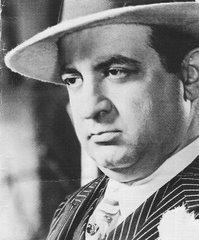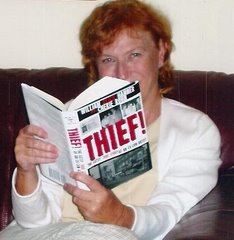Sheesh! First this ex-mobster rats out his colleagues, gets into the Federal Witness Protection Program, leaves it, and now he's stuck living off a paltry $30 grand a year. Oh the injustice! Does your heart bleed for this guy? Neither does mine.
After the Mob, He’s Just Scraping By
By ALAN FEUER
Published: April 29,2010
SOMEWHERE IN SOUTH FLORIDA
Josh Ritchie for The New York Times
HIDING “There’s not a lot of ads out there saying, ‘Wanted: Ex-crime boss of a Mafia family. Ten years experience required,’ ” Mrs. DeFede said.
A SATURDAY, 11 a.m. Seniors’ hour at the diner.
An old man with a hearing aid butters his toast. Two Jamaican nurses help a woman with a walker through the door. An elderly mother and her daughter share a stack of pancakes, the mother guiding her fork past the oxygen tube in her nose.
Sitting in one booth with his wife, the former acting boss of the Luchese crime family tucks into his $4 plate of scrambled eggs. He wears a pink Hawaiian shirt, a gold medallion, a brand-new pair of therapeutic sneakers. He is talking about the old days: everything he had, everything he lost.
“How much money?” he asks, responding to the question with a question.
“Awww, tons of money,” he answers. “It’s hard to say how much.”
This is Joe DeFede, a retired New York gangster who oversaw the rackets in the city’s garment district in the 1990s, a perch that provided him with a Cadillac, a driver, three horses stabled at Aqueduct and a home entertainment system columned in the style of ancient Greece. Like many mobsters, he walked through life with dignity and pride and, usually, with several thousand dollars in his pocket.
These days, though, he walks with a faltering step of age and with the weight of financial worry. After a five-year prison stint, legal fees and the crushing costs of creating a new identity — he entered but then left the witness protection program — the boss is almost broke. He and his second wife, Nancy, live on an annual income they said was not much more than $30,000: Social Security, a modest annuity and her pension from 20 years of working in a bank.
“That’s the fear we got,” said Mr. DeFede, 76, a slight man with a bookmaker’s grin who is known as Little Joe. “We try to keep our payments up” — for the car, the house, a recent hip replacement — “but sometimes we can’t hack it.”
Or as Mrs. DeFede, 74, explained, “We’re just scraping by.”
It might be hard to muster sympathy — especially in the midst of a recession — for a guy who once earned his living shaking down businesses and taking illegal bets, even if he served his sentence and testified at several federal trials that helped put his former Mafia colleagues behind bars. But there is no such thing as a Gangster I.R.A., so the DeFedes are living check to check (and under assumed names) on the hard edge of a sharp financial knife.
They are hardly the first to struggle in their golden years when the years that went before were lived outside the law. Before the film “American Gangster” revived his finances, Frank Lucas, who earned — then lost — millions as a heroin dealer, was living in a public housing project in New Jersey. (He is now trying to start his own fashion line.) Henry Hill, a Luchese family associate whose story formed the basis for the movie “Goodfellas,” sells signed posters as well as his memoirs and cookbooks at the Web site goodfellahenry.com.
“These people wind up as desperadoes in a sense,” said Nicholas Pileggi, who wrote, among other things, the screenplay for “Goodfellas.” “They come up with different schemes to survive without a 401(k). Don’t forget, they were hustlers to begin with.”
The DeFedes fit that mold: friendless, jobless and, faced with an uncertain future, living on their wits. Mrs. DeFede has sold jewelry — a ruby necklace, an emerald bracelet — to help support the household and has even written a book about her trials, “Life With Little Joe.”
It is a love story, sort of, opening with a startling scene of a young Mr. DeFede slapping her face. The manuscript encompasses their lives together: from obscurity to opulence, from the bulletproof vest she once found in her husband’s closet to their nervous flight into the federal government’s arms. While one might think a mob moll’s tell-all would make for an easy sale, that has not been the case. Mrs. DeFede’s agent spent an unsuccessful year shopping the book around. The couple still hopes the manuscript will provide them a nest egg. Publish or perish, Mafia style.
Last year, Mrs. DeFede took a job as a cashier at a clothing store. It paid $7.50 an hour and required cleaning toilets. She lasted three days.
As for her husband, she is apt to say, “There’s not a lot of ads out there saying, ‘Wanted: Ex-crime boss of a Mafia family. Ten years’ experience required.’ ”
Not unlike their law-abiding counterparts, they are filled with rage and bitterness — and violent apprehension — at their economic prospects. Mr. DeFede is so suffused with anxiety he sleepwalks and, in that state, literally punches the walls.
“Joe has fights in his sleep, cursing at some shadowy figure from the past,” Mrs. DeFede wrote one evening, jotting down thoughts for a reporter. “He has hit me several times during these episodes. Of course, he didn’t mean to harm me, but after one really bad incident, I was trying to calm him down and I got punched in the face.”
Mr. DeFede was nearing 70 when he got out of prison and discovered that a contract had been taken on his life. He was accused — wrongly, he insists — of stealing nearly a million dollars of Luchese family money. “If I did what they said I did,” he reasoned one night at the dismal bar of a chain restaurant, “you think that I’d be here?”
The DeFedes met in 1958 and married 12 years later, each with a divorce in the rear view. A couple of years ago, they settled here in a 55-and-older community— they insisted its name be withheld for security reasons — and have built a pleasant, albeit precarious, life.
Family is far away: Mrs. DeFede’s son is in New York, in the throes of a recent divorce. Mr. DeFede’s daughter is on Long Island, but visiting is difficult — she lives with his former wife.
They have grandchildren in San Diego but cannot afford the plane ticket. “It’s lonely living alone,” said Mrs. DeFede, a classic tough cookie with an Irish-American wit. “Holidays are the worst. You see other people with their families and it totally breaks your heart.”
A few years ago, her oldest friend from Brooklyn moved into the neighborhood to be with her. But there was drinking, petty fights and eventually unkind words; part of the problem was the friend started dating a retired cop. The two have parted ways, potentially forever. How does one explain oneself to the neighbors, after all?
“We don’t have a life,” Mrs. DeFede said.
What they do have is each other. Mrs. DeFede carries her husband’s glasses and double-checks his payments on the bar bill. Mr. DeFede cleans the gutters — he did, at least, until his hip went bad. She makes suggestions of what he ought to order from the menu. He drives her to the beauty parlor and waits until she is done. She back-seat drives from the front seat of the car.
When evening comes, they watch television together — the History Channel, “Divorce Court,” “Everybody Loves Raymond.” Mr. DeFede plays solitaire. He visits the barbershop, not to have his hair cut, but for company. “They’re Cubans, so they don’t speak too much English — it’s difficult,” he said.
One recent Saturday, they visited a flea market. Mr. DeFede pulled into a spot and hung his disabled parking permit from the mirror. He stepped outside and observed his front bumper, scratched like a scabbed shin.
“Five years old,” he said. “I never drove a car five years old before.” He put his hands together, palms up, and shook them back and forth in disbelief. “Remember that song?” he asked. “ ‘If My Friends Could See Me Now’?”
Inside the bazaar, Mrs. DeFede looked at several items she could not afford. A patterned blouse. A yellow purse. Shoes.
“You see what I’ve done to her?” asked Mr. DeFede, looking on. “You see this? She could’ve had anybody. Anybody. She ended up with me.”
















